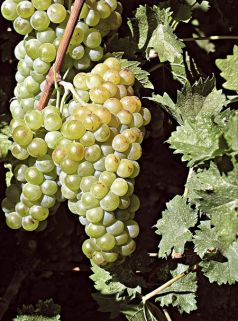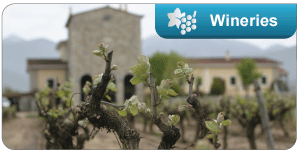Muscat White
The love of Muscat White for sunlight is common knowledge. It thrives when the sun warms up its small berries, bestowing on their thick skin a freckle-dotted yellow-gold color and uniquely concentrating the variety’s aromas and flavor. As a result, small-berried Muscat White yields dessert wines of international stature (“Muscat of Patras”;“Muscat of Rio Patras”; “Muscat of Rhodes”; “Samos” ; and “Muscat of Cephalonia”).
The love of Muscat White for sloping, mountain vineyards can hardly be concealed although it also thrives at lower altitudes as well. The Aegean islands of Samos and Rhodes, the vineyards of Rio in Patras, Patras itself and Cephalonia are the predominant cultivation areas of Muscat White. All areas correspond each to their invididual PDO zones when it comes to production of their sweet Muscat wines (PDO Samos; PDO Muscat of Rhodes; PDO Muscat of Rio Patras; and PDO Muscat of Cephalonia, respectively). In all of those areas, the wines are among the most highly acclaimed Greek wines, having won rave reviews, top ratings, and numerous prestigious awards in international competitions and wine tastings. All Muscat White wines produced share the same organoleptic features: explosive aromas where the variety’s primary aroma and that of lychee are intensely present; the concentrated taste; and the satisfying acidity, all elements that we also encounter in the variety’s dry wines as well but to a lesser degree. Oaking tends to benefit these… elixirs by concentrating them even more, all the while bestowing on them honeyed notes redolent of nuts and homemade preserves.
Small-berried Muscat White is certainly one of Greece’s most important grape varieties. Under the glorious Greek sun it is transfigured into grand wines which express the unique terroir of their origin: Wines that are ready to leave even the most exacting wine lovers speechless yet happy that they have had the kind of unforgettable wine experience that leaves one hanging for more!



